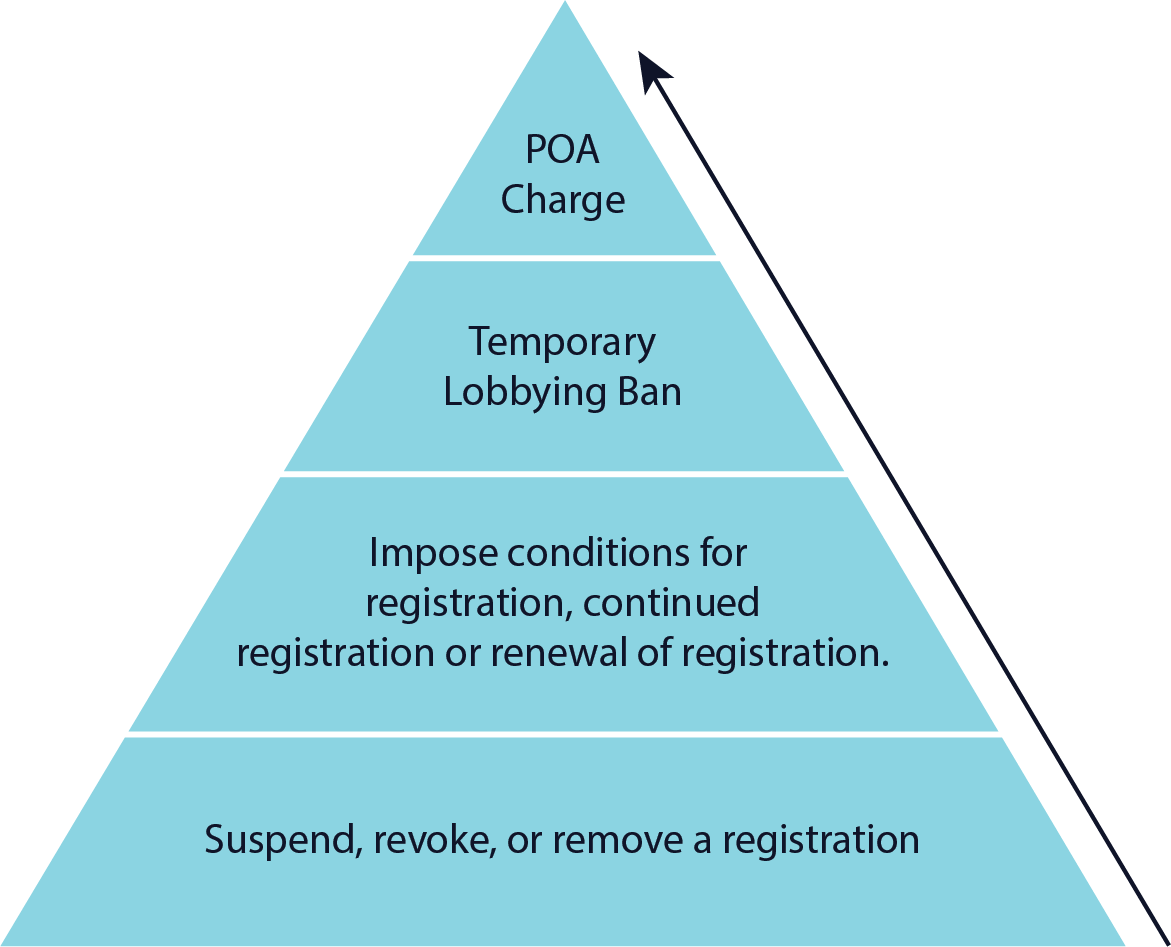
The Toronto Lobbyist Registrar tracks lobbying activities and regulates lobbyists’ conduct.
We accept confidential inquires regarding allegations of potential breaches of the By-law.
To submit an inquiry regarding a potential breach of the By-law please click the button below:
Enforcement of the Lobbying By-law – Interpretation Bulletin, December 6, 2016
IMPORTANT NOTE: This Interpretation Bulletin provides information only and does not constitute legal advice. For more information, please contact the Toronto Lobbyist Registrar by email at lobbyistregistrar@toronto.ca or call 416-338-5858 to speak to a Lobbyist Registry Advisor.
Principles
The Toronto Lobbyist Registrars preferred enforcement approach is to educate lobbyists in advance regarding the requirements of the Lobbying By-law and to encourage lobbyist to seek proactive guidance on matters so that non-compliance is avoided.
Enforcement Tools
Where there are issues of non-compliance, the Lobbying By-law gives the Lobbyist Registrar the following range of enforcement powers:
The conditions include:
The power, on finding a breach of the Lobbying By-law, to impose a temporary ban on lobbying for breaches of the Lobbying By-law based on an escalating scale, in accordance with the following scheme:
*Please note, multiple breaches arising out of the same inquiry may result in the Lobbyist Registrar imposing a ban at step two or three of the scale.
Enforcement Approach
The preferred enforcement approach is for the Lobbyist Registrar to progressively escalate the Registrar’s responses until a lobbyist complies. While this is the preferred response, the Lobbyist Registrar may move to any level of enforcement response permitted by the Lobbying By-law and/or employ multiple enforcement tools, if the circumstances warrant it.
For example, there may be situations where the facts make it appropriate for the Lobbyist Registrar to by-pass the first two enforcement options and move straight to a temporary ban or a serial offender may be charged with a POA offence and temporarily banned from lobbying.
The escalating approach to non-compliance is depicted in Figure 1 below

Revised on March 27, 2013
The Registrar conducts inquiries into matters relating to compliance with the registry and the Lobbyists’ Code of Conduct in private, unless:
The Registrar may refuse to inquire into a request where, in the Registrar’s opinion, one or more of the following circumstances exist:
If, on its face, the request concerns an allegation of a criminal nature consistent with the Criminal Code of Canada or an offence under any other Act, the requester shall be advised that if the requester wishes to pursue the allegation, the requester must pursue it with the appropriate police force or other authority.
As required by section 169(7) of the City of Toronto Act, 2006, if at any time during the inquiry the Registrar determines that there are reasonable grounds to believe that there has been a contravention of any other Act or of the Criminal Code of Canada, the Registrar shall immediately refer the matter to the appropriate authorities and suspend the inquiry until any resulting police investigation and charge have been finally disposed of, and shall report the suspension to City Council.
Upon completion of an inquiry and prior to making a final report, the Registrar may provide the proposed findings and sanctions to the respondent, together with an opportunity to respond either in person or in writing on the proposed findings and any recommended sanctions.
We may need to disclose your complaint in the following circumstances: